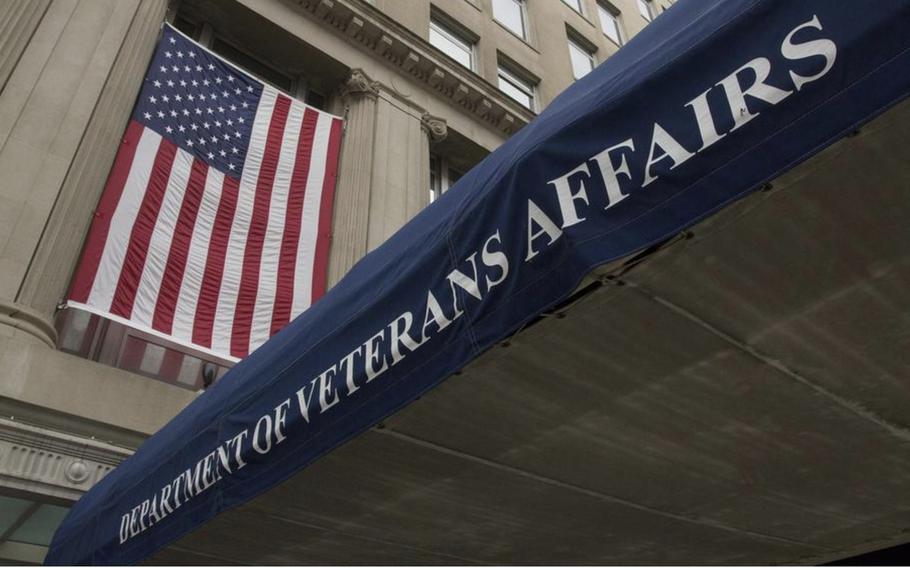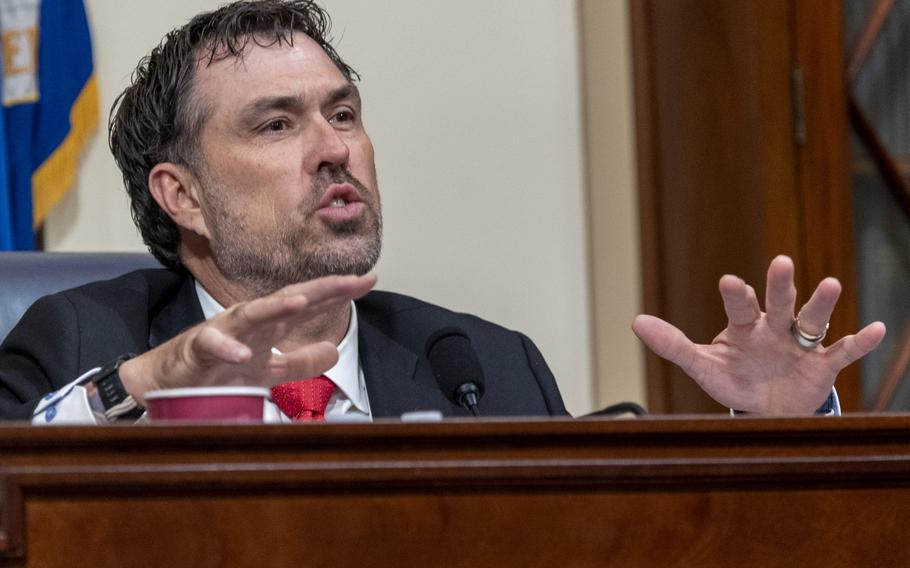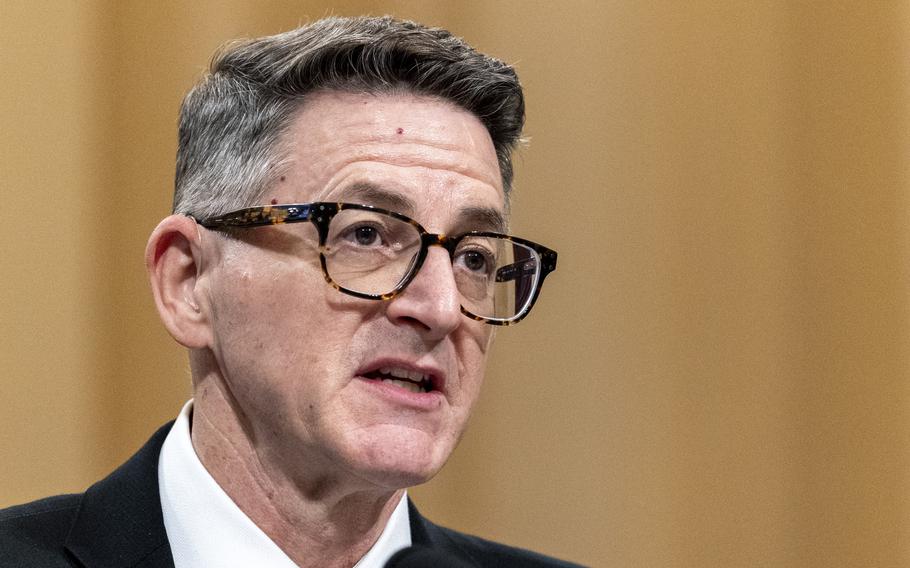
The Department of Veterans Affairs building in Washington. (Stars and Stripes)
WASHINGTON — Veterans groups urged the Department of Veterans Affairs to take steps to end common mistakes in claims reviews for disability that include redundant requests for veterans to undergo more medical exams when the clinical diagnoses already are in their records.
Veterans of Foreign Wars and Disabled American Veterans were among veterans advocacy groups to identify problems and offer recommendations at a hearing Wednesday of the House Veterans’ Affairs Committee’s subpanel on disability assistance and memorial affairs.
The hearing examined common errors that delay claims processing and contribute to a backlog of veterans’ requests for disability benefits to cover illnesses and injuries incurred from military service.
The VA reported a backlog of more than 230,000 claims on April 5, according to the agency’s website. Claims are considered backlogged when a decision has been pending for more than 125 days.
“Every veteran and survivor deserve a timely decision on a claim,” said subcommittee chairman Rep. Morgan Luttrell, R-Texas.
“We need to make sure the VA systems work the best they can and that we empower employees to do their best work,” said Rep. Morgan McGarvey, D-Ky., the top Democrat on the subcommittee.

Rep. Morgan Luttrell, R-Texas, makes remarks during a House hearing in November 2024. (Eric Kayne/Stars and Stripes)
Disabled American Veterans said the group helped veterans file more than 500,000 claims in fiscal 2024 for illnesses and injuries connected to their military service.
But DAV and other veterans groups raised concerns about “claim overdevelopment” that leads to mistakes and delays in decisions for compensation. Claim overdevelopment is a term that refers to repeated and unnecessary requests by VA processors for medical exams to support a disability award, Luttrell said.
The VA pays government contractors to conduct these medical exams. But duplicate exams often are mistakenly ordered when there is sufficient medical documentation in a veteran’s file, he said.
Luttrell said he has introduced legislation called the Review Every Veterans Claims Act to address the problem.
In fiscal 2023, 2.4 million medical exams were completed to support disability claims, which increased to 3.2 million in fiscal 2024, Luttrell said. Most of those exams were government funded, he said.
But an audit has shown the VA spent $1.4 million on unnecessary medical exams in a six-month period in 2023, Luttrell said.
“Overdevelopment drives government waste because VA pays contracted exam vendors for every exam, even for those that were never necessary,” he said.
Even simple mistakes in improperly indexing claims submissions can lead to redundant and costly requests for re-documenting medical evidence, according to Marquis Barefield, assistant national legislative director at the DAV.
Veterans also receive vague notices asking for more medical documentation without a clear explanation about why their original submission was determined to be incomplete, he said.
Processors also will mistakenly order clinical exams unrelated to a veteran’s specific medical condition, especially in more complex cases involving illnesses and injuries from toxic exposures while on active duty, according to Barefield.
Veterans who present medical diagnoses and records from private physicians outside the VA also seem to encounter more obstacles and delays in receiving decisions, he said.
But Kenneth Smith, assistant deputy undersecretary for field operations management at the Veterans Benefits Administration, said the VA recently added training to help claims processors avoid mistakes and delays.
He said the VA is adopting a tool that gives processors a checklist to review before deciding whether more medical documentation is needed to support a claim. New VA policies emphasize government-contracted medical exams are not required when there is sufficient evidence in a veteran’s records to support an award, Smith said.

Kenneth Smith, assistant deputy undersecretary for field operations management at the Veterans Benefits Administration, testifies April 9, 2025, during a House Committee on Veterans’ Affairs hearing. (Eric Kayne/Stars and Stripes)
Nancy Springer, associate director of national legislative service for Veterans of Foreign Wars, echoed the comments of DAV.
Processors often conduct only a cursory check of a veteran’s records before ordering medical exams when the necessary documentation is in their records, according to Springer.
The VFW sees many instances of the VA failing to fully review a veteran’s records, she said.
“Claims for conditions related to toxic exposures seem especially prone to overdevelopment. Presumption of service connection satisfies the need for a medical opinion if the claimant’s service record substantiates service in an exposure location and eliminates the requirement for further medical examination,” Springer said.
It also is common for a contracted clinician to contradict the diagnosis of a physician in a veteran’s records, according to Springer.
“Sending the physician’s medical opinion to a lesser-credentialed medical professional, such as a nurse practitioner, for confirmation and certification causes unnecessary delay,” she said.
Barefield recommended the VA expand specialized training for processors for handling more complex claims, including from veterans exposed to toxins and veterans reporting illnesses or injuries connected to military sexual trauma.
DAV also urged the VA to strengthen protocols for medical evaluations so veterans are not repeatedly sent back to clinicians for additional medical evidence.
A union official from the American Federation of Government Employees recommended the VA keep the same regional office involved in the decision-making process of individual claims.
When claims are bounced from one regional VA office to another, processors often misunderstand the work that has been done and prolong the review, said James Swartz, president of AFGE Local 2823, which represents employees at the Cleveland regional office of the Veterans Benefits Administration.
He suggested the VA assign claims to processors based on their individual availability instead of the current practice of allotting a set number of claims per day to each regional office regardless of existing caseloads.